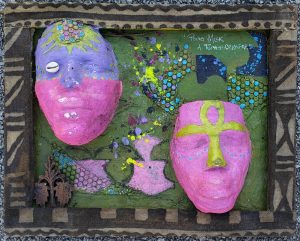(Click to Enlarge)
Mixed Media – Acrylic paint, canvas, cut canvas, plastic, cowrie shell, wood
xx x xx inches
Mask measure xx inches in height
Titled Power Mask and signed A. Turner-Crawford upper right
Chicago origin.
Arlene Turner-Crawford – Statement / Bio
To me, art is ritual, an attempt to interpret higher expressions of life. As an image maker, my work is expressed through both realistic and symbolic forms. This is done in an attempt to inform the viewer of a cultural continuum. My images are created through the manipulation of form, design, color, collage and assemblage.
EDUCATIONAL BACKGROUND
MS.Ed Indiana University, Herron School of Art, Indianapolis, IN. 1977
University of Massachusetts, MFA candidate in studio painting & printmaking, Amherst, MA. 1972
B.S.Ed. Northern Illinois University, DeKalb, IL. 1971
Selected Recent Project and Exhibitions
“Sankofa for the Earth”, Collaborative Installation, co-artists: Dorian Sylvain & Raymond Thomas, Burnham Wildlife Corridor, 2016
“FREE AT FIRST: The Audacious Journey of AACM”, DuSable Museum of African American History, 2015
“AfriCOBRA: Art and Impact”, Curator, DuSable Museum of African American History, July 2013
Sapphire & Crystals Remember: Marva Pitchford Jolly, Southside Community Art Center, 2013
“State of Grace”, Sapphire & Crystals Group Show, Woman Made Gallery, 2012
“Ordinary Dissonance”, Curator Group Show, Addison Center for the Arts, 2012
“Renaissance Reloaded”, Black History Month Exhibition, Evanston Art Center
Arlene has served on the Executive Board of the African American Arts Alliance, co-founded the Sutherland Community Arts Initiative and has been a participating artist since the inception of Sapphire & Crystals, a collective of African American women artists. She is an image-maker who works in the media of painting, assemblage/college, drawing, graphic design and illustration. Influences in her work have come from her family; AfriCOBRA artists; Black Classical Music (jazz); research and meditation.
“I AM because We ARE”, was the hue and cry: a call to purpose within the Black Arts Movement. As a child of the ‘60s, I became enthralled with art because of the Black Arts Movement. It was a time when artists were the vanguard, actively in the cultural forefront. As an image-maker, you could choose to elevate your culture by providing a medium for our profoundness and our glory. The artists were continuing the traditions of our cultural humanity. I was fortunate enough to have met many of the movers and shakers of that era.
Portfolio:
A.Turner-Crawford
My art work in a context; my aesthetic influences have been shaped by the Black Arts Movement, which to me, is a continuum of the intellectual and cultural achievements of the Harlem Renaissance. That was a time when the creative “talented tenth” sought content and inspiration from African culture and history. For me, the Black Arts Movement was an extension or transliteration of that cultural imprint brought into the ‘60’s. African culture is the stalk from which Black people spring, it holds a core foundation to our spiritual, psychology and social development. The experiences of slavery, reconstruction, civil rights and other altering events have had a profound effect on the art and consciousness of Black people. For me, artistic subject matter is inspired by our origins, our history and our declarations of self-determination. It is the Black artists who will determine, what is beautiful, whole and authentic about Black People and their community. And a form of self-determination is identifying and validating their aesthetic principles.
Having said that, the following are some of the elements which I use in my within my work.
Frontality of the form: Representational images, which help the viewer identify the subject;
Rhythm / syncopation / improvisation – principles key to African and Black American music i.e. jazz or rather Black Classical music; R&B and the Blues;
Color – Bright and vital, Kool-aide colors, like the visual energy that Black people use to adorn themselves;
Function inherent in the visual statement, a message is conveyed: I choose words or symbols to communicate some of these themes: who we were, who we are, who we hope to become; our contributions to life and values. source: artavita.com




